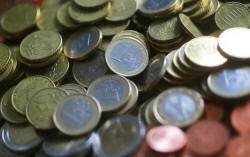Euro slips under $1.18 to one-month low as eyes turn to
Macron
 Send a link to a friend
Send a link to a friend
 [September 26, 2017]
By Jemima Kelly [September 26, 2017]
By Jemima Kelly
LONDON (Reuters) - The euro slipped below
$1.18 for the first time in over a month on Tuesday after its worst day
this year, as investors worried that months of coalition talks in
Germany could hit the economy and make closer euro zone integration
difficult.
German Chancellor Angela Merkel, who won a fourth term in elections on
Sunday but now faces a tough juggling act to form a government with
other parties, on Monday struck a note of caution with respect to French
calls for fiscal union.
French President Emmanuel Macron, who wants a fundamental overhaul of
the European Union's single currency zone and whose ideas include
creating a euro zone budget and a euro zone finance minister, will lay
out his plans in a speech in Paris at 1300 GMT.

But the results of Germany's election have forced Merkel to consider a
new coalition including the liberal Free Democrats (FDP), a party
critical of Macron's ideas on Europe, and investors are therefore
worried the reforms that they would welcome will not end up going
through.
"The German election was a blow for Macron too frankly, not only
Merkel," said Neil Jones, Mizuho's head of hedge fund FX sales in
London.
"EU-wide politics is on the back burner right now, in favor of domestic
priorities."
The euro slipped half a percent to as low as $1.1786 <EUR=>, its weakest
since Aug. 25, after falling around 0.9 percent on Monday - its heaviest
one-day loss since December.
Commerzbank currency strategist Thu Lan Nguyen, in Frankfurt, said hopes
for greater euro zone integration had been the main cause of a more than
10 percent appreciation by the euro against the dollar since the first
round of France's presidential election.
"The euro has been appreciating since the French elections because of
the push by Macron for fiscal union," she said.

[to top of second column] |

An illustration picture shows euro coins, April 8, 2017. REUTERS/Kai
Pfaffenbach

"There is some uncertainty (over that) in the market now against the background
of the German elections."
The euro faced additional pressure on Monday when European Central Bank
President Mario Draghi singled out currency volatility as a source of
uncertainty that required monitoring and argued that "ample" ECB accommodation
was still needed.
YELLEN IN FOCUS
The dollar was flat at 111.80 yen, having earlier dipped against the Japanese
currency as worries over North Korea flared up again amid an escalating war of
words between it and the United States.
The yen made sharp gains versus the greenback on Monday after the North Korean
foreign minister said President Donald Trump had declared war on the country and
that Pyongyang reserved the right to take countermeasures, including shooting
down U.S. bombers even if not in its air space.
The dollar index, which measures the greenback against a basket of six major
currencies but is heavily skewed toward the euro, hit its highest in four weeks
<.DXY>.
Immediate focus was on what views might be expressed by Fed Chair Janet Yellen,
who is due to speak in Cleveland at 1645 GMT on "inflation, uncertainty, and
monetary policy".

New Zealand's dollar extended the previous day's slide and was down 0.6 percent
at $0.7223 <NZD=D4>, having sunk after the country's National Party won the
largest number of votes in Saturday's election but not enough seats to govern
outright.
(Reporting by Jemima Kelly,; Additional reporting by Shinichi Saoshiro in
Tokyo,; Editing by John Stonestreet and Ed Osmond)
[© 2017 Thomson Reuters. All rights
reserved.] Copyright 2017 Reuters. All rights reserved. This material may not be published,
broadcast, rewritten or redistributed. |